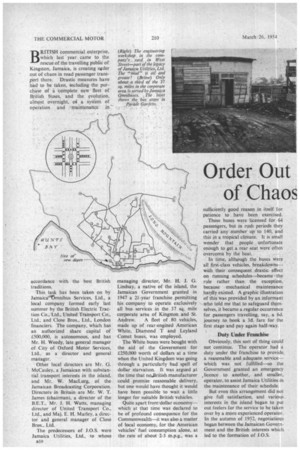Order Out of Chaos
Page 45

If you've noticed an error in this article please click here to report it so we can fix it.
BR1TISH commercial enterprise, which last year, came to the rescue of the travelling public of Kingston, Jamaica, is creating order out of .chaos in road passenger transport there. Drastic measures have had to be taken, including the purchase of a -complete new fleet of British buses, and the evolution. almost overnight, of a system of operation and -maintenance in
accordance with the best British traditions.
This task has been taken on by Jainaicai5mnibus Services, Ltd., a local company formed early last summer by the British Electric Traction Co., Ltd., United Transport Co., Ltd., and Close Bros., Ltd., London financiers. The company, which has an authorized share capital of £500,000, is autonomous, and has Mr. H. Weedy, late general manager of City of Oxford Motor Services, La. as a director and general manager.
Other local directors are Mr. G. McCauley, a Jamaican with substantial transport interests in the island, and Mr. W. MacLurg, of the Jamaican Broadcasting Corporation. Directors in Britain are Mr. W. T. James (chairman), a director of the B.E.T., Mr. .1. H. Watts, managing director of United Transport Co., Ltd., and Maj. E. H. Marley, a director and general manager of Close Bros., Ltd.
The predecessors of J.O.S. were Jamaica Utilities, Ltd., to whose al 0 managing director, Mr. H. J. G. Lindsay, a native of the island, the Jamaican Government granted in 1947 a 21-year franchise permitting his company to operate exclusively all bus services in the 37 sq. mile corporate area of Kingston and St.
Audrew. A fleet of 80 vehicles, made up of rear-engined American White, Diamond T and Leyland Comet buses, was employed.
The White buses were bought with the aid of the Government for £250,000 worth of dollars at a time when the United Kingdom was going through a particularly bad spell of dollar starvation. It was argued at the time that no.„13ritish manufacturer could promise reasonable delivery, but one would have thought it would have been possible to wait a little longer for suitable British vehicles.
Quite apart from•dollar economy— which at that time was declared to be of profound consequence for the Commonwealth—it was also a matter of local economy, for the American vehicles' fuel consumption alone, at the rate of about 2-3 m.p.g., was a sufficiently good reason in itself for patience to . hav,e been 'exercised. These buses were licensed for 64 passengers, but in rush periods they carried any number up to 140, and this in a tropical climate. It is small wonder that people unfortunate enough to get a rear seat were often overcome by the heat.
In time, although the buses were all first-class vehicles, breakdowns— with their consequent drastic effect on running schedules—became i the rule rather than the exception. because mechanical maintenance har:clly existed. A graphic illustration of this was provided by an informant who told me that to safeguard themselves, it became a regular occurrence for passengers travelling, say, a 6d. journey to book a 3d. fare for the first stage and pay again half-way.
Duty Under Franchise
Obviously, this sort of thing could not continue. The operator had a duty under the franchise to provide, a reasonable arid adequate service— which was not fulfilled—so the Government granted an emergency ,licence . to another, and smaller, operator, to assist Jamaica Utilities in the maintenance of their schedule.
But even this arrangement did not give full satisfaction, and various interests in the island began to put out feelers for the service to be taken Over by a more experienced operator. In the autumn of 1952, negotiations began between the Jamaican Government and the British interests which led to the formation of J.O.S.





































































































